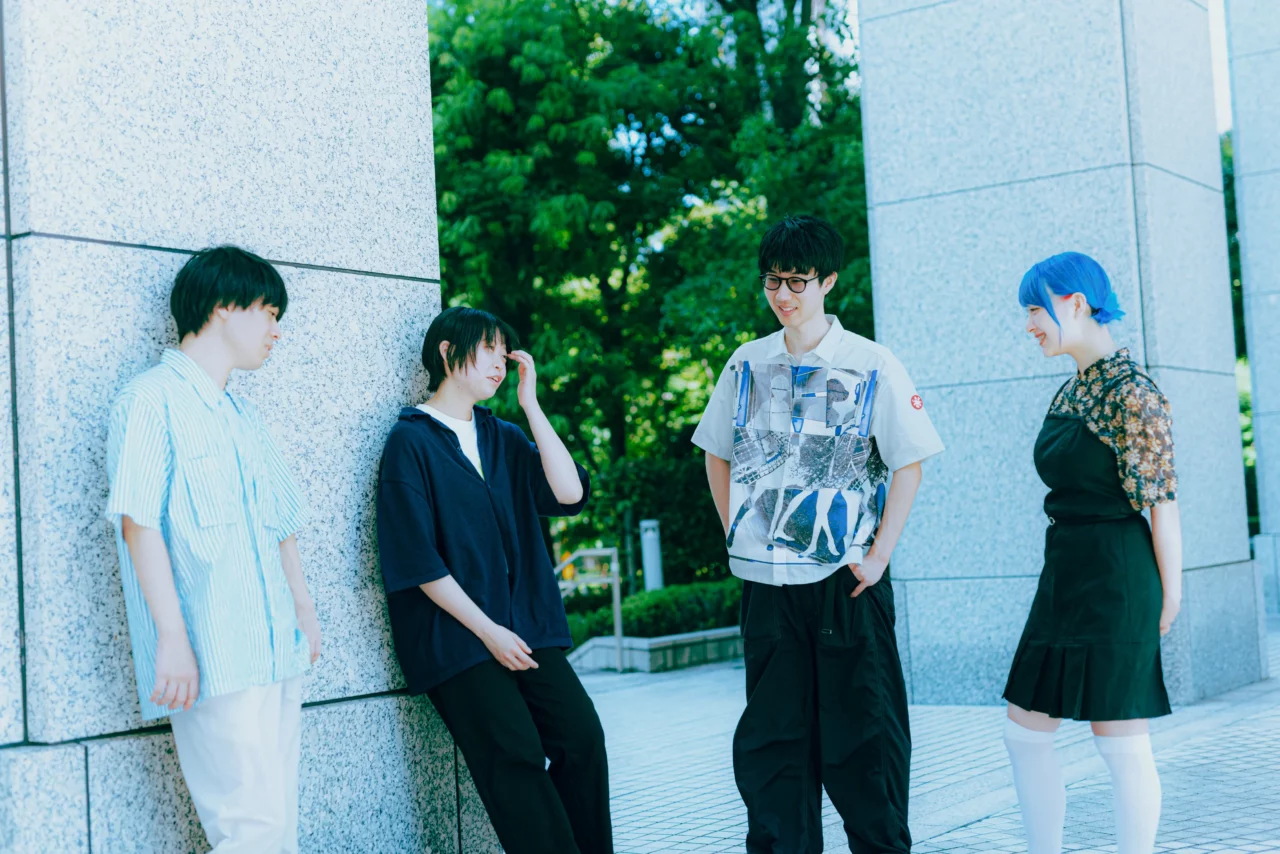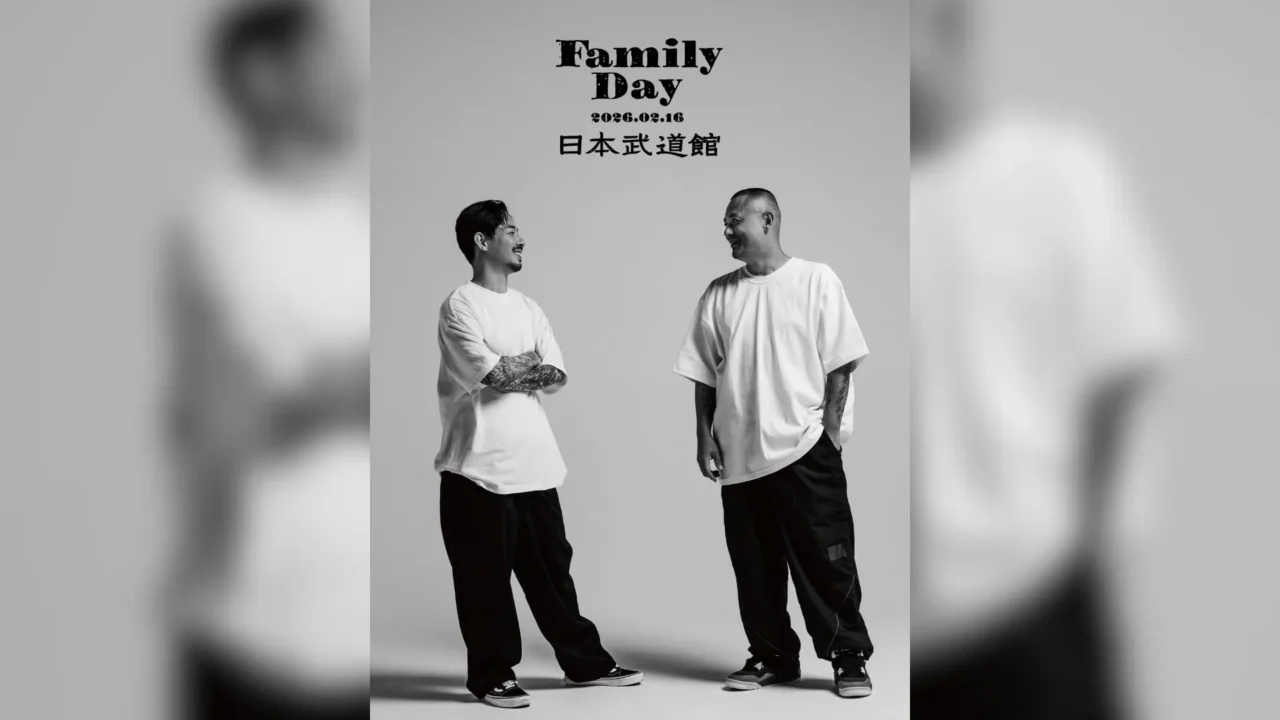INDEX
Making “Japanese Lyrics” Stand Out in Electronic Music
I’d like to ask about Pasocom Music Club’s album. Takahashi-san, you continue to participate as a vocalist in “Drama” for this new release, just as you did in the previous album (“FINE LINE,” released in 2023), correct?
Takahashi: For “Day After Day,” it was my first time participating as a featured vocalist, which was really nerve-wracking. It was a valuable experience that gave me a chance to understand my role within the song and how to approach singing from an objective perspective.
This time, with “Drama,” I feel that the vocals have a stronger presence as a hook in the song. I was happy to sing a track related to the album’s theme, “The Rustle of Love,” which involves childhood memories and children’s voices.
Nishiyama: Both Shibata and I truly think that Mei’s voice is fantastic, and we’ve always wanted to work with her again. With “Love Flutter,” we wanted to present it more as a “dance music album” compared to the previous one, and we aimed to emphasize the beat over the vocals.
For “Drama,” we wanted to create a sense of space and make the arrival of the vocals feel even more beautiful. The track is inspired by the concept of Electric Groove’s “Niji”—creating a cathartic moment when the vocals finally come in. Mei has a remarkable ability to convey that sense of release and pleasure with her voice, so I feel “Drama” fits really well and I’m quite pleased with it.
Iwai: “Drama” felt like a new experience for me, different from the way vocals are used in LAUSBUB, and it was very stimulating. It offered a fresh perspective on how vocals can be integrated into dance music.

With “Child Replay” featuring Satoko Shibata and “Yuragi” featuring tofubeats, the album showcases a particularly memorable flow of vocals. How do you balance “dance” and “vocals” in these tracks?
Nishiyama: For these two tracks, they were definitely created with a focus on pop and “vocals.” I see both Satoko Shibata and tofubeats as “singer-songwriters” with personal sensibilities that I wanted to feature.
While placing emphasis on the “vocals,” I still wanted them to be pop songs within the context of “dance music.” Recently, I’ve been considering reducing the amount of “vocals” in our music, but for these two tracks, I intentionally increased the vocal presence.
Nishiyama: Also, there’s the inherent difficulty in putting Japanese lyrics over dance music. I often think about “What is Japanese music?” and it’s not just about whether it has Japanese melodies or not. It’s more about how much music created by Japanese people, deriving from Japanese origins, actually exists.
So, whether to sing in English or not—many have experimented with this historically. Nowadays, especially, people are trying various approaches to find their identity through their music.
Indeed, with Latin American pop music like reggaeton dominating the charts and K-POP global hits symbolizing the trend, the widespread use of streaming services has made it possible for anyone to access music from around the world. As a result, there’s been a heightened awareness of how to incorporate regional and national identities into one’s own music, which feels like a different dimension from nationalism.
Nishiyama: In Japan, it’s true that we’ve been incorporating and reinterpreting imported music for a long time. Very few people would listen to traditional Japanese music like gagaku as “pop music.” The music we create, especially, is heavily influenced by overseas trends. It’s not easy to find definitive answers to this issue.
How do you currently view the role of vocals in LAUSBUB?
Iwai: During the album-making process, I honestly felt that while Mei is a fantastic singer, I struggled to create music that was centered around vocals. Even when making vocal tracks, they tended to come off as a bit aloof.
So, we each focused on the types of music we were into—mine was footwork, and Mei’s was collage music. Both genres involve sampling and manipulating sounds, so we applied that approach to “cutting and pasting” vocals. However, the final track, “TINGLING!,” is probably the one where vocals are more central to the composition.
Takahashi: I think vocals play a role in making our music more pop-oriented, but as Riko mentioned, it’s quite challenging. For instance, with tracks like “Sweet Surprise,” the vocals have more of a mysterious and cold vibe rather than a straightforward pop presence. In their own way, I think this approach fits well with LAUSBUB’s style.
Iwai: I’d like to give a bit more thought to the nature of songs.
Nishiyama: May I ask LAUSBUB a question? When I listened to ‘ROMP,’ I felt a more direct influence of Cornelius compared to your previous works. The way you use phrases and where the guitar comes in, for example—do you feel that Cornelius has had a significant influence on you?
Iwai: Yes, that’s true. I wasn’t consciously aware of it while creating the music, but when I listened to it afterward, I noticed that it has a similar atmosphere to ‘Point’ (2001), with a touch of minimalism. I think the influence of Cornelius is ingrained in me, almost like a habit.

























